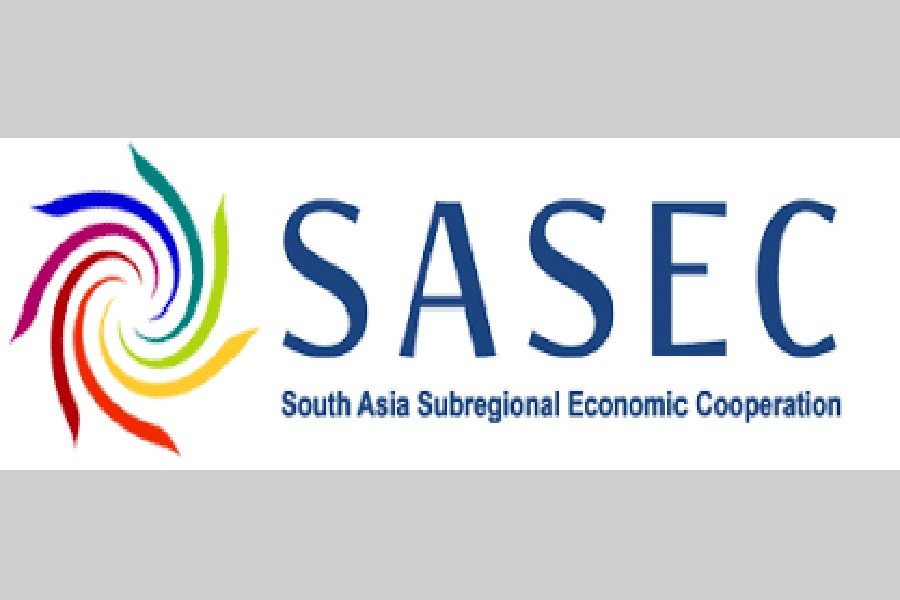
Published :
Updated :

The Asian Development Bank (ADB) has launched an initiative under its South Asian Sub-regional Economic Cooperation (SASEC) programme to conduct country and regional diagnostic studies on Sanitary and Phyto-Sanitary (SPS) and Technical Barriers to Trade (NTB) in the SASEC countries.
Bangladesh, Bhutan, India, Maldives, Myanmar, Nepal and Sri Lanka are the member of SASEC. Thus the sub-region is basically SAARC (South Asian Association for Regional Cooperation) minus Afghanistan and Pakistan or BIMSTEC (Bay of Bengal Initiative for Multi-Sectoral Technical and Economic Cooperation) minus Thailand.
The ADB draft report on SPS and TBT faced by Bangladesh in SASEC has mentioned that India has some 41 SPS and TBT-related measures on frozen shrimp (HS Code 030616), which are excercised by at least six different authorities for testing, inspection, and certification. But for the same product, United Kingdom (UK) imposes only 10 SPS and TBT measures, administered by a single authority. Thus, it is easier to comply with the UK requirements than India. Again, Sri Lanka imposes 33 SPS and TBT measures on imported black tea (HS Code 090230), whereas the UK imposes only 15 SPS and TBT measures on the same product imported from other countries.
Such exhaustive requirement of SPS or TBT measures is very difficult to comply with. Exporters try to avoid those markets where number of such measures is high, and compliance is fraught with complexities and lack of transparency. No wonder, trade among the SASEC and SAARC countries has not grown much.
The main objective of the ADB initiative is to catalogue the SPS and TBT measures applicable in the case of export of merchandise products in the sub-region by the member countries and also to identify the items which have potential for exports but face SPS and TBT as trade-impeding barriers in the importing countries.
SPS and TBT are two critical Non-Tariff Measures (NTMs) on trade. Theoretically, these are not intended to restrict trade flows but to focus on ensuring safety of human, animal and plant health and environment. The World Trade Organisation (WTO) has two comprehensive agreements on SPS and TBT. The agreements outline the characteristics of these measures and provide legal framework to use these.
The WTO defines SPS measures as laws, rules, standards and procedures set or imposed to protect human, animal and plant health from risks that come from the spread of pests and diseases, or from additives, toxins, or contaminants found in food, beverages, or feedstuffs. TBT covers product standards, technical regulations, environmental regulations and voluntary procedures relating to human health and animal welfare. TBT is basically a set of specific characteristics of a product, such as its size, shape, design, function and performance or the way it is packaged or labelled before it is put to sell.
Dealing with SPS and TBT is a challenging task, especially for the developing countries. It requires comprehensive understanding, extensive database and vast technical skills. Countries also need to learn
from their trading partners. A regional approach may work better to enhance the understanding on SPS and TBT.
Most of the SASEC countries have been struggling to develop stronger capacities to deal with SPS and TBT. Policymakers and businesses in these countries still lack comprehensive understanding of SPS and TBT measures. While different bodies and organisations are working on SPS and TBT, they are not always sufficiently equipped and related rules and regulations are not adequately updated.
In Bangladesh, there are at least 15 rules, regulations and policies related to SPS and TBT. Different ministries, bodies and organisations are responsible for implementing or enforcing these rules and policies. The related bodies, however, lack coordination.
The WTO cell in the Ministry of Commerce is currently the national notification authority of SPS measures and Bangladesh Standards and Testing Institutions (BSTI) is focal point for TBT. SPS measures are more comprehensive than TBT measures. Ministries of agriculture, health, fisheries and environment and their respective departments or divisions are involved in SPS related matters. Local businesses are not fully aware of the different SPS measures and functions of the related government bodies.
Moreover, it is difficult to get comprehensive information on SPS and TBT in Bangladesh through a single window. There is no such body or umbrella organisation nor even any electronic platform. Only Bangladesh Trade Portal provides two separate links of the SPS and TBT enquiry points. One can send a request to the points seeking information on any SPS or TBT measure.
Another problem is that there is little understanding on SPS and TBT measures of the trading partners, including the member countries of SASEC. Exporters have to learn on SPS or TBT measures through the export procedures. Non-transparent nature of trading partners also makes it difficult to know about the SPS and TBT measures.
SASEC member countries should reduce the SPS and TBT measures and also harmonise some of these measures. But whatever steps are required to deal with the SPS or TBT, these have to be supported by sufficient infrastructure, including testing laboratories. The ADB draft report has rightly mentioned that improving the quality of infrastructure in terms of institutional capacity - both physical and human - is very important for Bangladesh in this regard. This improvement requires big investment in a planned manner.
Meanwhile, Asian Regional Standards Organisation (SARSO) has already been established and it is working to develop and adopt some common standards for the SAARC countries. SASEC diagnostic studies may push the effort further.


 For all latest news, follow The Financial Express Google News channel.
For all latest news, follow The Financial Express Google News channel.